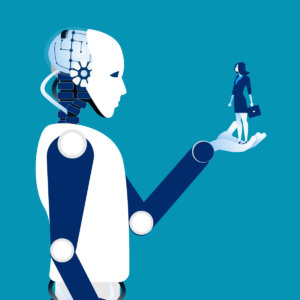Could AI Be the Cure for Workplace Gender Inequality?
Artificial intelligence is beginning to replace many of the workplace roles that men dominate. The parts of those jobs that will have staying power are those that rely more heavily on emotional intelligence — skills in which women typically excel.
Topics
Artificial Intelligence and Business Strategy
In collaboration with
BCGMany researchers are reporting, and our research confirms, that artificial intelligence (AI) will reshape our economy — and the roles of workers and leaders along with it. Jobs that don’t disappear will see a significant shift as the tasks that are easily and inexpensively accomplished by robots become automated. The work that remains will very likely focus on relating. To adapt and prosper, the smart worker will invest in “human relating” skills — empathy, compassion, influence, and engagement. For simplicity, let’s call these emotional quotient (EQ) skills. These are skills in which women commonly excel.
Gender differences are a sensitive topic and we address them in this article with trepidation. There is a fine line between understanding commonalities and stereotyping, and the debate about nature versus nurture is robust. But whether you believe that men and women, on average, have different types of brains (as Simon Baron-Cohen, a British clinical psychologist and professor of developmental psychopathology at the University of Cambridge, has theorized) or that gender differences are a result of cultural norms and conditioning (as numerous other studies have explored), the real-world results are similar: Men and women, on average, excel in different dimensions and take on different roles in the workforce. By no means does that suggest that men and women are not equal — just different.
It is clear that men have quite an advantage in the working world — just check out the latest research by McKinsey & Co. on gender equality in the workplace. Men have greater representation among leadership roles, greater presence in higher-paid industries, hold nearly 80% of board seats, and earn higher compensation on average, even for the same jobs.
We believe that AI has the ability to help level the playing field. It will do so, we think, by replacing many roles and functions where men typically dominate.
Jobs That Currently Demand High EQ Are Dominated by Women
An examination of common occupations by gender in the U.S. by the Department of Labor reveals some unsurprising data. Women predominate in jobs that involve relating, caretaking, and providing services, making up more than 80% of the country’s school teachers, nurses and home health aides, social workers, and secretaries and administrative assistants.

